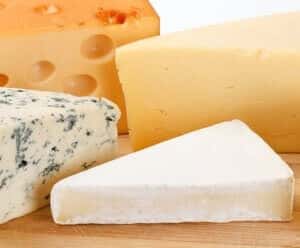
Allergy sufferers know frustration. The difficulties of just trying breathe through the nose during hay fever season are significant. That’s without counting other allergy symptoms such as trying to navigate the world when you feel like you’re swimming in molasses. Post-nasal drip is also a big problem for many people with allergies. Could the simple but drastic measure of cutting out dairy help ease their suffering?
Reader Reports Results from Cutting Out Dairy:
Q. For years I suffered from sinusitis and hay fever. It started with seasonal allergies when I was 38. Then I had summer colds and eventually all-year-long sniffling. I used to joke that I had snot dripping off my elbows.
It became intolerable. I was eating lots of dairy, especially milk and cheese. When I read about the dairy connection, I immediately cut it out of my diet.
Magically, my allergies abated. Gradually I learned that some baked goods (containing milk) also caused a flare-up, so off with them! Now I take no OTC allergy pills. The antihistamine cetirizine caused crazy brain fog that also cleared up.
Now if I wake with an itchy throat or a bit of stuffiness, which is rare, I take stinging nettle and a quercetin supplement for immediate relief.
Food and Pollen Allergies Linked:
A. Allergies of various sorts tend to be connected (Annals of Allergy, Asthma & Immunology, Nov. 2018). Consequently, people with food allergies often have hay fever as well. They may even have eczema or asthma. However, the link between dairy consumption and nasal congestion remains controversial. Despite a dearth of research to support this specific association, many readers share your perspective. Cutting out dairy seems like a low-risk approach.
Quercetin and Stinging Nettle for Hay Fever:
Quercetin is a natural compound derived from plants. It stabilizes mast cells that release histamine and has anti-inflammatory activity (Inflammation & Allergy Drug Targets, Sept. 2010). Many people with seasonal allergies find it helpful. In addition, researchers using sophisticated techniques have discovered exactly how it blocks inflammation (International Journal of Molecular Science, June 17, 2019).
Stinging nettle (Urtica dioica) also has scientific support against allergies (Phytotherapy Research, July, 2009). Unfortunately, allergists have not conducted clinical trials on this herbal medicine.
Citations
- Silverberg JI et al, "Association of atopic dermatitis with allergic, autoimmune, and cardiovascular comorbidities in US adults." Annals of Allergy, Asthma & Immunology, Nov. 2018. DOI: 10.1016/j.anai.2018.07.042
- Chirumbolo S, "The role of quercetin, flavonols and flavones in modulating inflammatory cell function." Inflammation & Allergy Drug Targets, Sept. 2010.
- Cheng SC et al, "Quercetin inhibits the production of IL-1β-induced inflammatory cytokines and chemokines in ARPE-19 cells via the MAPK and NF-κB signaling pathways." International Journal of Molecular Science, June 17, 2019. DOI: 10.3390/ijms20122957
- Roschek B et al, "Nettle extract (Urtica dioica) affects key receptors and enzymes associated with allergic rhinitis." Phytotherapy Research, July, 2009. https://doi.org/10.1002/ptr.2763

